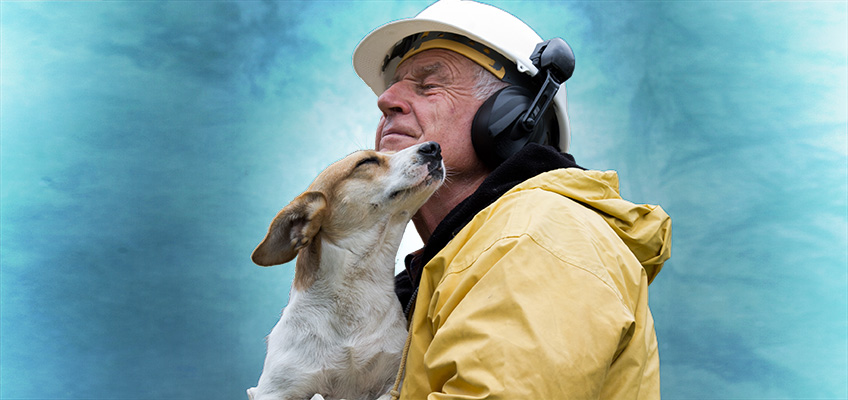
com•pas•sion
noun [kem-pa’-shen]
- a feeling of wanting to help someone who is sick, hungry, in trouble, etc.
We reach out to those in pain, take in stray animals and dash off our checks to help strangers suffering across the globe. Humans are compassionate toward those in need. In fact, considerable scientific research suggests, we may actually be compelled to be compassionate.
"Our human compassion binds us the one to the other – not in pity or patronizingly, but as human beings who have learnt how to turn our common suffering into hope for the future."
– Nelson Mandela
The Instinct for Compassion
That humans are instinctively compassionate is a viewpoint that has been expressed, hypothesized and tested in multiple studies over the last two decades. Some of this research is referenced in the widely circulated article, The Compassionate Instinct, by UC Berkeley Psychology Professor Dacher Keltner. He cited different studies that showed similar neurological reactions in mothers seeing pictures of their own or others’ babies and subjects asked to think about people being harmed.
The neurological reactions occurred in areas of the brain associated with positive emotions, said Keltner, founding faculty director of the school’s Greater Good Science Center.
“This consistency strongly suggests that compassion isn’t simply a fickle or irrational emotion, but rather an innate human response embedded into the folds of our brains,” Keltner wrote in the 2004 article.
At the HeartMath Institute, researchers led by Dr. Rollin McCraty, Ph.D. went beyond this in the study, The Physiological and Psychological Effects of Compassion and Anger.
A group of participants, who learned HeartMath’s Freeze-Frame® Technique, were instructed to self-induce care and compassion for five minutes. Another group were instructed to freely experience any emotions they felt while watching a video of Mother Teresa, an emotion-inducement method utilized in previous research.
The results for both groups were substantial and sustained, showing an increase in participants’ immunoglobulin (IgA) levels, a reliable barometer of the body’s immune system activity and proficiency.
Genuine Compassion and its Many Rewards
Whether through their philosophies, religions, writings or family traditions, cultures past and present have extolled the virtue and reward gained by expressions of genuine compassion for all sentient beings. Again, more than being a proposition widely held in all world societies, many scientists believe and have set out to prove that compassion is biologically based.
In the Association of Psychological Science’s May/June 2013 issue of Observer, Stanford University’s Emma Seppala, Ph.D., writes: “Human suffering is often accompanied by beautiful acts of compassion by others wishing to help relieve it.”
The alleviation of suffering appeared visibly rewarding in infants – whether by them or others – during research at the Max Planck Institute for Human Cognitive and Brain Sciences in Leipzig, Germany, Seppala wrote. She is the associate director of Stanford’s Center for Compassion And Altruism Research And Education.
“A recent study they ran indicated that infants’ pupil diameters (a measure of attention) decrease both when they help and when they see someone else helping,” Seppala said, “suggesting that they are not simply helping because helping feels rewarding.”
Looking at compassion from another perspective Seppala asked: “What led 26.5 percent (U.S. Labor Department) of Americans to volunteer in 2012?”
"If you want others to be happy, practice compassion. If you want to be happy, practice compassion."
– The Dalai Lama
If, as mounting evidence suggests, humans are biologically wired for compassion, that’s a good thing. Beyond the inherent joy of showing compassion to others, there are wonderful benefits to be gained by people who engage in compassionate acts.
The case made by Stony Brook University’s It’s good to be good: 2011 5th annual scientific report on health, happiness and helping others is frank in its assessment and compelling as an argument if only because of the depth of the scientific research upon which it relies.
“Happiness, health and even longevity are benefits that have been reported in more than fifty investigations using a variety of methodologies,” wrote the article’s author, Stony Brook Professor Stephen G. Post, Ph.D.
“The conclusion of this review is that when we help others, we help ourselves, with the caveat that we need balance in our lives and should not be overwhelmed,” said Post, head of Stony Brook’s Division of Medicine in Society and director of the Center for Medical Humanities, Compassionate Care and Bioethics. “The evidence for the benefits of giving is now extremely powerful and suggests that health-care professionals might wish to recommend such activities to patients.”
Among the wealth of research Post referenced was The Nun Study correlating longevity with the positive attitudes expressed through the autobiographical writings of 678 Catholic sisters.
Another study he cited started in 1956 and tracked 427 wives and mothers for 30 years. Regardless of all sorts of conditions, including “number of children, marital status, occupation, education or social class, those women who engaged in volunteer work to help other people at least once a week lived longer and had better physical functioning,” Post said.
Self-Compassion and Overcare
HeartMath founder Doc Childre writes about the critical need for self-compassion – taking care of you when you are in need or hurting – and the importance of not engaging in overcare – trying to do too much to ease others’ pain and suffering.
“Much of the global population tends to feel a little shy about radiating love and compassion to themselves,” Childre explains. “It can seem selfish or self-centered, or we might feel we don’t deserve it. … Self-compassion and self-care maintenance are a first step in increasing the quality and effectiveness of our love and compassion for others.
“Two of the biggest energy drains on the planet are overcare and the sympathy we project. As the planetary shift continues, these types of energy drain will dissipate as we mature into a new era of intelligence. As we learn to balance our empathetic interactions through practice we can sense and feel compassion for the stresses of others, but we still can maintain our objectivity, emotion regulation and resilience.”
Even as research shows a biological basis, or instinct for compassion in humans, it’s easy in our fast-paced, do-it-now world to put off or get sidetracked from helping others.
HeartMath’s Heart Lock-In® for Increasing Compassion
- Start by focusing in the heart and breathing in love from the universal source. Then breathe self-compassion into your cells. Continue to do this for a few minutes.
- Radiate compassion out from your heart to people and the world around you. Send out compassion as radiance and care with understanding of what people are going through. Imagine the light of compassion lifting the hearts of others. Continue to do this for a few minutes or longer, and create a heart-filled environment of compassion.
Do you feel compassion is an instinct, or is a learned attribute?

